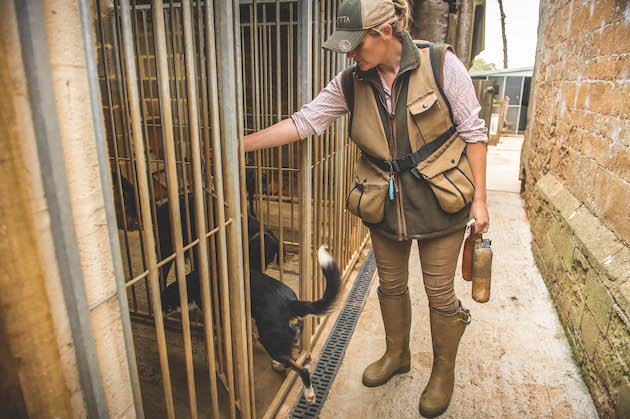Depression: what it means for gun owners
Anybody can suffer from depression. It is an illness that does not discriminate. Anyone who thinks they are suffering should…
 HAGXB4 Labrador puppy sleeping on a fluffy cushion
HAGXB4 Labrador puppy sleeping on a fluffy cushion
With the prospect of lockdown being eased or hopefully ending, there is a good chance that the vast majority of dogs will soon have to become accustomed to a new routine. For the past year, many dogs have had the luxury of having their owners at home most of the time. For young dogs and ‘lockdown puppies’, this may be all they have ever known.
As the world begins to return to normal and most return to work, social events and holidays, dogs will soon find themselves spending more time alone. As any experienced dog owner will know, this change can cause serious issues for the dogs’ mental state unless it is handled correctly. In fact, this is one occasion when I feel having a kennel is a massive help, as it is easy to ensure the dog learns to settle alone. If a dog is kept solely in the house, it is sometimes difficult to have somewhere to separate them so they can learn to settle in their own company.

Kennels can help a dog to get used to its own company
Changing dogs’ routines too suddenly can lead to psychological issues such as separation anxiety, stress and depression. Depression in dogs is a rare and less well-known issue. For many, this may seem an unrealistic and even ridiculous idea. However, there are many examples of animals suffering from what can only be described as depression or even grief.
When I was 15 years old, my family got a German shepherd bitch called Dora. She spent her entire life with me. She was the first of my German shepherds to come picking-up and beating, and she even attended three years of university with me.
When she was six years old, I left for six months, travelling the world. For weeks after I left, she became subdued, withdrawn and did not want to do anything that normally held joy for her. After about a month, she slowly started to perk up. Some days were better than others, but with some time and TLC, she returned to something approaching her old self.
She didn’t display the normal signs of separation anxiety — chewing, howling, pacing and so on — nor the same quick recovery when people returned. The only explanation was grief and/or depression. The strangest thing was when I returned. My parents brought her to the airport to meet me. You would think she would go mad and bounce around.
She saw me and, having had a good smell, simply lay down in the back of the truck. It was as if she had come to terms with the fact that I had died, so me returning really threw her. She didn’t move a muscle for nearly two hours. When the Labradors saw me and all bounced around happy, she then went absolutely mad. Crying, barking, jumping, smothering me. It was as if she simply couldn’t believe I was back until the other dogs had confirmed it was me.
Dogs need a calm, confident leader, someone they trust and enjoy working with
It would appear that it is not only dogs that can suffer. One of our Labrador puppies joined our family when my pet cat was only 10 months old. They constantly played and became the best of friends, sleeping, walking and even eating together.
When Cara, the Lab, was 13, she died of old age. We buried her in the garden next to our other family dogs. My cat spent hours of the following days simply sitting on the mound of dirt, staring at the ground. Within a week, we found him lying dead in the garden. He had been physically very healthy — except for a broken heart.
According to the experts, it is very difficult to determine if dogs suffer from depression, purely because we cannot ask them. According to Bonnie Beaver, the executive director of the American College of Veterinary Behaviorists, “in clinical practice, there are a few situations where it is the only explanation”. It is noted that depression is very different from other behavioural problems, such as separation anxiety. It always follows the occurrence of a significant event — the death of a family member, for example. Unlike separation anxiety, dogs will recover with time and TLC.
So how do we know if a dog is depressed? John Ciribassi, past president of the American Veterinary Society of Animal Behaviour, says: “Dogs will become withdrawn. They become inactive. Their eating and sleeping habits often change. They don’t participate in the things they once enjoyed.”
If your dog displays any of these symptoms, it is important to first ensure there is nothing physically or physiologically wrong with them. Inactivity and lethargy can easily be due to arthritis or any number of other conditions, so an examination by a vet is advised.
Keeping to routines and staying active will help a depressed dog to heal
Dogs are a great deal more aware and perceptive of our emotions than we give them credit for. This is relevant in all aspects of training a dog. Anyone with any experience will tell you that the moment you get frustrated during a training session, the dog will pick up on it, so it is best to stop. They can read and identify sadness, anger and frustration, as well as many other emotions.
Anybody can suffer from depression. It is an illness that does not discriminate. Anyone who thinks they are suffering should…
Bearing this in mind, a depressed dog could simply be responding to the emotions and reactions of other family members. A dog will often be a reflection of its owner’s energy and emotions. So if the human is stressed, the dog will mirror this. Balance is key The theory of training dogs has altered so much in the past few decades. The old methods of being ‘dominant’ over a dog are rapidly being overtaken by positive reinforcement. However, many handlers seem to misinterpret what both of these mean. Dominance does not mean being a bully; the same as positive reinforcement does not mean never being able to say no.
Dogs require a stable, calm, confident leader. Someone they respect, but trust. Someone they enjoy working with and will happily follow. So when a family member or pet dies, it is up to the handler to show the dog how to cope, how to move on and how to behave.
Try to keep to routines, remain active and ensure you keep engaging with them. They should follow your example and settle again, within a few days or possibly a couple of months.
It is also important to ensure that you are not reinforcing incorrect behaviour. Comforting a dog at the wrong time can be mistaken as a reward. Make sure there are signs of happiness, ensure there is praise, affection or treats. Avoid lavishing praise, attention and treats on a dog that is moping.
If the above is not working, there are various medications that can be used, though for the vast majority of cases this would not be necessary. The medications used in dogs are very often the same as those used in depressed humans. For cases such as depression, a great number of vets would refer the dog to a specialist.
According to one vet I spoke to about depression in dogs, medications used for things such as separation anxiety can also be used for treating depression. For example, amitriptyline is prescribed for separation anxiety but is also an antidepressant. They are tricyclic antidepressants working on serotonin receptors, histamine receptors and adrenalin. But he also said that it was extremely rare for owners to approach vets with this problem.

It’s important for owners to make sure they avoid lavishing praise, attention and treats on a dog tha ttis moping
If you remain a sceptic about depression in dogs, there is one more thing you could do — visit a rescue centre. For a lot of dogs, the reality of being left at a shelter is too much to take. The overwhelming noise, unfamiliar people, smells and surroundings mean the dogs often withdraw into a subdued state, showing very little joy in anything. Many struggle to show any personality or joy until they settle in their new homes and begin to trust their new family. We use dogs in so many walks of life. Dogs can detect all sorts of conditions within humans and are so often the key to support and recovery for us. It would be nice to think that we could reciprocate this. If ever you feel your dog is suffering from signs of depression, it is your job to ensure you remain their calm, comforting leader. Keep to routines, offer comfort at appropriate moments and help them to move on.
Get the latest news delivered direct to your door
Discover the ultimate companion for field sports enthusiasts with Shooting Times & Country Magazine, the UK’s leading weekly publication that has been at the forefront of shooting culture since 1882. Subscribers gain access to expert tips, comprehensive gear reviews, seasonal advice and a vibrant community of like-minded shooters.
Save on shop price when you subscribe with weekly issues featuring in-depth articles on gundog training, exclusive member offers and access to the digital back issue library. A Shooting Times & Country subscription is more than a magazine, don’t just read about the countryside; immerse yourself in its most authoritative and engaging publication.

